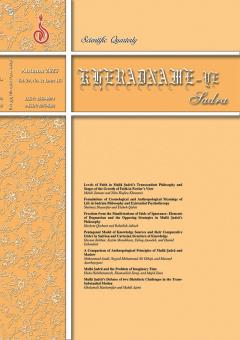Mullā Ṣadrā and the Problem of Imaginary Time
Subject Areas : Studies on Mulla Sadra and the Transcendent Philosophy
Huda Habibimanesh
1
,
shamsollah seraj
2
*
![]() ,
Maijd Ziaei
3
,
Maijd Ziaei
3
1 - PhD candidate of Islamic Philosophy and Kalam Department, Ilam University, Ilam, Iran
2 - Associate Professor, Islamic Philosophy and Kalam Department, Ilam University, Ilam, Iran
3 - Assistant Professor, Islamic Philosophy and Kalam Department, Ilam University, Ilam, Iran
Keywords: origination of the world, temporal origination, renewed origination, imaginary time, trans-substantial motion, Mullā Ṣadrā,
Abstract :
One of the most controversial philosophical-kalami issues in the history of Islamic philosophy has always been the analysis of the problem of the origination and pre-eternity of the world. Most Muslim mutikallimūn believe in the temporal origination of the world and consider the pre-universe time to be “imaginary”. As the most supreme philosopher of the Transcendent Philosophy, Mullā Ṣadrā has also discussed imaginary time in different places in his works. He has adopted two different approaches to this theory but does not express his view explicitly. The present study explains Mullā Ṣadrā’s opinions regarding the theory of imaginary time and his two approaches in this respect in order to answer the question of what his ultimate standpoint regarding imaginary time is. In order to accomplish this task, the authors have referred to the scattered discussions in his works and, after studying and explaining the relationships between them and combining them with each other, have provided a description of Mullā Ṣadrā’s ultimate view. Although in some places he tries to justify the theory of imaginary time based on his own principles, given his explicit statements on negating an intermediary between the world of being and Almighty Necessary as well as his demonstration of the existence of time and rejection of the arguments of deniers of time, it can be concluded that his ultimate view here is the negation of imaginary time.
ابنسینا (1404ق) التعلیقات، قم: مرکز نشر اسلامي.
الهی قمشهای، مهدی (۱۳۶۳) حکمت الهی عام و خاص، تهران: اسلامی.
جرجانی، علی بنمحمد (1370) التعریفات، تهران: ناصر خسرو.
خمینی، روحالله (1381) تقریرات فلسفه، تهران: مؤسسۀ تنظيم و نشر آثار امام خمينی (ره).
خوانسارى، آقاجمال (1378) الحاشية على حاشية الخفری على شرح التجريد، تصحيح رضا استادى، قم: کنگره بزرگداشت محقق خوانساري.
رازى، فخرالدين (1986م) الأربعين فی أصول الدين، قاهره: مكتبة الكليات الأزهرية.
زنوزی، ملاعبدالله (1381) لمعات الهیه، تصحیح سیدجلالالدین آشتیانی، تهران: مؤسسه پژوهشی حکمت و فلسفه ايران.
سبزواری، ملاهادی (۱۳۸۳) أسرار الحکم فی المفتتح و المختتم، تصحیح کریم فیضی، قم: مطبوعات دينی.
سجادی، جعفر (1373) فرهنگ معارف اسلامی، تهران: دانشگاه تهران.
شیروانی، علی (1390) ترجمه و شرح نهایة الحکمة، قم: دار الفکر.
طباطبایی، سیدمحمدحسین (1387) آغاز فلسفه، ترجمۀ محمدعلی گرامی، قم: بوستان کتاب.
طوسى، خواجه نصيرالدين (1405ق) تلخيص المحصل المعروف بنقد المحصل، بيروت: دار الأضواء.
کربن، هانری (۱۳۸۱) مقدمه بر المشاعر صدرالمتألهین شیرازی، تهران: بنياد حکمت اسلامی صدرا.
لاهیجی، محمدجعفر (1386) شرح المشاعر ملاصدرا، قم: بوستان کتاب.
مجلسى، محمدباقر (1404ق) بحار الأنوار، بيروت: مؤسسة الوفاء.
محمدى، علی (1378) شرح كشف المراد، قم: دار الفکر.
مطهری، مرتضی (1376) مجموعه آثار، تهران: صدرا.
معلمی، حسن (1385) تاریخ فلسفۀ اسلامی، قم: مرکز جهانی علوم اسلامی.
ملاصدرا (1378) رسالۀ فی الحدوث، تصحیح و تحقیق حسین موسویان، تهران: بنياد حکمت اسلامی صدرا.
ملاصدرا (1380) الحكمة المتعالية فى الأسفار الأربعة، ج2، تصحیح و تحقیق مقصود محمدی، تهران: بنياد حکمت اسلامی صدرا.
ملاصدرا (1382) شرح و تعلیقه صدرالمتألهین بر الهیات شفا، تصحیح نجفقلی حبیبی، تهران: بنياد حکمت اسلامی صدرا.
ملاصدرا (1383) الحكمة المتعالية فى الأسفار الأربعة، ج3، تصحیح و تحقیق مقصود محمدی، تهران: بنياد حکمت اسلامی صدرا.
ملاصدرا (1393) شرح الهدایة الاثیریة، ج1: فی الطبیعیات، تصحیح و تحقیق مقصود محمدی، تهران: بنیاد حکمت اسلامی صدرا.
میرداماد (1374) القبسات، بهاهتمام مهدی محقق، تهران: دانشگاه تهران.
نائیجی، محمدحسین (1387) ترجمه و شرح کتاب نفس شفا، قم: مؤسسه امام خمينی(ره).
نراقى، ملامهدى (1381) اللمعات العرشية، كرج: عهد.
نراقى، ملامهدى (1423ق) جامع الأفكار و ناقد الأنظار، تهران: حكمت.

